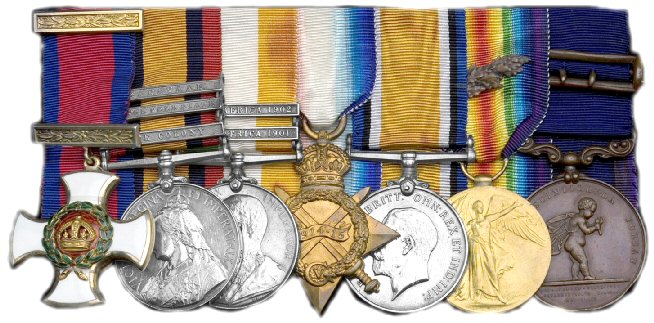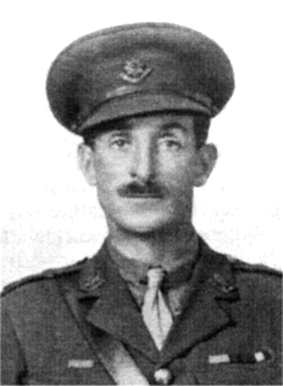Lieutenant-Colonel Edward Thomas John KERANS, D.S.O.
Commanded the 4th Battalion Worcestershire Regiment from 1915 to 1917.
Lieutenant-Colonel Edward Thomas John Kerans was born on 26th February, 1880. As a student in Ireland, age 13, he was one of the youngest recipients of the Royal Humane Society Life-Saving Bronze Medal award. He served in South Africa with the Imperial Yeomanry as a Lieutenant in the 5th (Militia) Battalion of the Rifle Brigade. He was gazetted to the Worcestershire Regiment (from the Militia) on the 28th January, 1903. He was posted to the 4th Battalion and served with that Battalion in the Bermudas and in Malta. In 1906 he was seconded for a tour of duty with the West African Regiment in Sierra Leone. After returning to the 4th Battalion, then in India, he was appointed Adjutant in 1913. After the outbreak of war, in 1914, the 4th Battalion was brought home from Burma to form part of the famous 29th Division. With that Division the Battalion bore a distinguished part in the landing in Gallipoli, and in the subsequent battles of Krithia. He was wounded on 27th April, and sent home. As soon as his wound has healed Captain Kerans returned to the Battalion, in October 1915. All the old officers had by that time become casualties, and the Battalion was officered entirely by newly-joined 2nd Lieutenants. Captain Kerans took command, and led the Battalion throughout the severe trials of the floods in November, the evacuation of Suvla, and the subsequent evacuation of Helles, and was awarded a Brevet Majority. In March, 1916, the 4th Worcestershire, still commanded by Captain (Acting Lieut.-Colonel) Kerans, moved from Egypt to France and took part in the desperate fighting on the Somme in July and October of that year. In the following spring the Battalion was engaged in the Battle of Arras. On the 23rd April 1917, came the great fight now known as the Second Battle of the Scarpe. The Battalion attacked at the head of the 88th Brigade, and won their way forward to their objective, capturing three lines of German trenches, although unsupported on right and left. For his gallant leading in that fight Lieut.-Colonel Kerans was awarded the D.S.O. His health broke down shortly after this, and he was invalided home. |
Lieut.-Colonel E. T. J. Kerans D.S.O. |
After recovering Colonel Kerans was employed as an instructor at home. He again came to France in the Spring of 1918, and after being attached to 29th Division Headquarters, for a time was given command of the 2nd Army Musketry School, a position he held till the end of the War.
After the war he was transferred to the Royal Tank Corps, with which he served in Ireland and Palestine, and latterly in England till the time of his death in October 1927, at the early age of 47.
He was an officer of the greatest courage and determination, and it was largely owing to his leadership that the 4th Battalion did such splendid service in France in 1916-17.
Interestingly, one of Lieut-Colonel Kerans's sons, Captain P. W. (Mickey) Kerans, served in the 1st Battalion Worcestershire Regiment in the Second World War and on 25th April 1941, died of wounds received in the Battle of Keren (a strange coincidence of names). Another son was Lieut.-Commander John Kerans, who received the D.S.O. for effecting the escape of HMS Amethyst in the Yangtze Incident of 1949.


